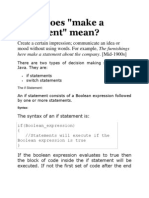0% found this document useful (0 votes)
19 views1 pageJava10 1
Conditional statements in Java allow for controlling the flow of execution based on conditions, with the if statement and switch statement being two common types. The if statement executes a block of code if a specified condition is true, while the switch statement is used for evaluating multiple conditions based on a single variable's value. Both statements are essential for decision-making in Java programming.
Uploaded by
gaikwadrushikesh957Copyright
© © All Rights Reserved
We take content rights seriously. If you suspect this is your content, claim it here.
Available Formats
Download as PDF, TXT or read online on Scribd
0% found this document useful (0 votes)
19 views1 pageJava10 1
Conditional statements in Java allow for controlling the flow of execution based on conditions, with the if statement and switch statement being two common types. The if statement executes a block of code if a specified condition is true, while the switch statement is used for evaluating multiple conditions based on a single variable's value. Both statements are essential for decision-making in Java programming.
Uploaded by
gaikwadrushikesh957Copyright
© © All Rights Reserved
We take content rights seriously. If you suspect this is your content, claim it here.
Available Formats
Download as PDF, TXT or read online on Scribd
/ 1

























































